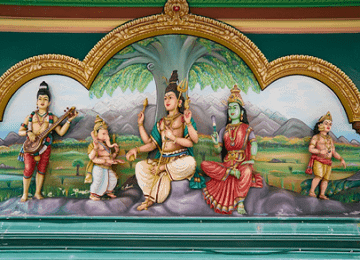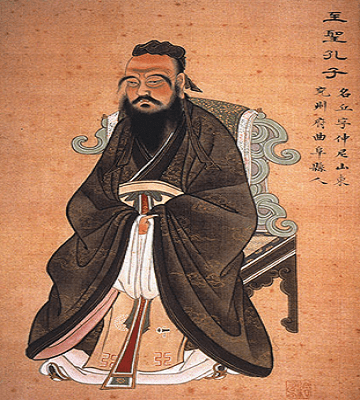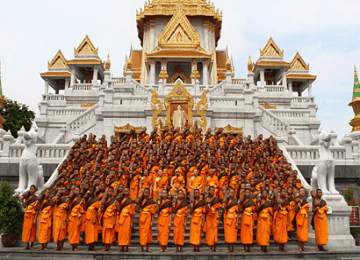
While written history is only around 5,000 years old, religion, in some form, has probably been around since the origins of mankind. Although several religions claim to have teachings that date back to the dawn of time, spiritual practices and beliefs have emerged and eventually faded out of history as often as empires. Several large religious movements have been lost to history, but several ancient religions are still practiced today.
It’s important to note that while a few of the following religions can definitively trace their origins, overall, its hard to know when most religions exactly emerged and dates can vary wildly depending on the reference.
8. Taoism (Circa 500 BCE)
Country or Region of Origin: China
Number of Current Followers: ~ 20 Million
Number of Current Followers: ~ 20 Million
 photo source: Wikimedia Commons
photo source: Wikimedia Commons photo source: Wikimedia Commons
photo source: Wikimedia Commons
Taoism (also called Daoism) is based on the teachings of the Tao Te Ching, a short book containing the teachings of Lao Tzu and emphasizes spiritual harmony within the individual. Although there isn’t a sharp distinction today, there are two main schools within Taoism: philosophical Taoism (Tao-chia), which tends to focus on the writings of Lao Tzu, Chuang-Tzu, and other early mystics; and religious Taoism (Tao-chaio), which emphasizes religious rituals aimed at attaining immortality.
Taoism is probably best known for drawing on the idea of unity and opposites or Ying and Yang. The main idea behind Yin Yang is that the world is filled with complementary forces such as action and non-action, light and dark, hot and cold, etc. Prior to the Communist revolution, Taoism was one of China’s strongest religions and it has recovered somewhat today as it is practiced in China, Taiwan, Southeast Asia, and in the West.
7. Confucianism (Circa 600 BCE)
Country or Region of Origin: China
Number of Current Followers: ~ 6 Million
Number of Current Followers: ~ 6 Million
 photo source: Wikimedia Commons
photo source: Wikimedia Commons photo source: Wikimedia Commons
photo source: Wikimedia Commons
Confucianism is often recognized as a religion although it is not practiced as a traditional organized religion and its believers view it more as a system of social and ethical philosophy. The religion gets its name from its founder, Confucius (an Anglicization of his actual name K’ung-fu-tzu, or Master K’ung), who did not set out to found a new religion, but was interested in reviving the values and beliefs of the Zhou dynasty.
Throughout the years, Confucianism has had a strong influence on the spiritual and political life of the Chinese people. Its influence has spread to other parts of East Asia including Japan, Korea, and Vietnam.
6. Jainism (Circa 600 BCE)
Country or Region of Origin: India
Number of Current Followers: ~ 4 Million
Number of Current Followers: ~ 4 Million
 photo source: Wikimedia Commons
photo source: Wikimedia Commons photo source: Wikimedia Commons
photo source: Wikimedia Commons
Jainism is another ancient religion from India that is believed to have emerged in the 6th Century BCE, around the same time as Buddhism, and shares similar beliefs to both Hinduism and Buddhism. The religion does not have a single religious text to draw from and its adherents believe instead that the truth has been revealed at different times by tirthankara (prophets), who have achieved the highest spiritual goal of existence.
Followers of Jainism believe that there have been 24 tirthankara and that the last of them was Mahavira, who is credited as the founder of Jainism and was also a contemporary of Buddha.
5. Buddhism (Circa 600 BCE)
Country or Region of Origin: Indian Subcontinent (Modern-day Nepal)
Number of Current Followers: ~ 500 Million
Number of Current Followers: ~ 500 Million
 photo source: Pixabay
photo source: Pixabay
Unlike most of the other ancient religions, Buddhism can trace its roots back to one founder, a prince who was born in modern-day Nepal over 2,500 years ago named Siddhartha Gautama. According to Buddhist history, Siddhartha Gautama cast aside his luxurious life as a prince after he witnessed the suffering outside the palace walls for the first time. After that, he sat beneath the Bodhi tree (the tree of awakening) and eventually reached enlightenment, thus becoming the Buddha.
Since then, followers of Buddhism practice the Buddha’s peaceful teachings and seek the path of enlightenment for themselves.
4. Shinto (Circa 700 BCE)
Country or Region of Origin: Japan
Number of Current Followers: ~ 4 Million
Number of Current Followers: ~ 4 Million
 photo source: Flickr
photo source: Flickr photo source: Flickr
photo source: Flickr
While many people believe that Shinto did not officially begin until after Buddhism was introduced to Japan around the 6th Century BCE, there is recorded history mentioning Shinto’s roots from around 700 BCE, although archaeological records date back further. After Buddhism arrived, many Buddhist elements were mixed into Shinto faiths and traditions, as well as Confucian ones.
The ruling aristocracy eventually combined all three religions and developed Shinto as a way to guide Japan’s people – Shinto was officially designated as Japan’s state religion during the Meiji Period (1868 – 1912). Today Shinto as well as Buddhism is closely tied to Japan’s society and culture.
3. Zoroastrianism (Circa 1,500 BCE)
Country or Region of Origin: Ancient Persia (Modern-day Iran)
Number of Current Followers: ~ 200,000
Number of Current Followers: ~ 200,000
 photo source: Wikimedia Commons
photo source: Wikimedia Commons photo source: Wikimedia Commons
photo source: Wikimedia Commons
Although Zoroastrianism was officially founded in the 6th Century BCE by the prophet and reformer Zoroaster, through archaeological evidence, the religion’s roots may date back between 1,200 – 1,500 BCE.At one point in history, Zoroastrianism was one of the most powerful religions in the world and served as the official religion of Persia from 600 BCE to 650 BCE. Zoroastrians believe in one God called Ahura Mazda and contrary to popular belief, are not fire worshippers – they believe that fire represents God’s light or wisdom.
While Zoroastrianism is a fairly small religion by comparison, it shares many central concepts with major religions such as Judaism, Christianity, and Islam.
2. Judaism (Circa 2,000 BCE)
Country or Region of Origin: Southern Levant (Modern-day Israel, Palestine, and Jordan)
Number of Current Followers: ~ 13 Million
Number of Current Followers: ~ 13 Million
 photo source: Pixabay
photo source: Pixabay photo source: Maxpixel
photo source: Maxpixel
Judaism is the oldest of the three monotheistic Abrahamic faiths, with the other two religions being Christianity and Islam. The religion was officially founded by Moses, although Jewish history can be traced back to Abraham, who is considered to be the ancestor of the Jewish people. While Judaism has many important and sacred texts, its most important religious document is the Torah, which is part of a larger text known as the Tanakh or Hebrew Bible.
Modern Judaism can be separated into three movements: Orthodox Judaism, which is the most conservative and retains nearly all traditional practices and rituals; Reform Judaism, whose followers retain their Jewish identity but take a more liberal and relaxed approach to many beliefs and practices; and Conservative Judaism, which lies in the middle and takes a moderate approach to Jewish practices.
1. Hinduism (Circa 7,000 BCE)
Country or Region of Origin: Indus River Valley (Modern-day Pakistan)
Number of Current Followers: ~ 900 Million
Number of Current Followers: ~ 900 Million
 photo source: Pixabay
photo source: Pixabay photo source: Maxpixel
photo source: Maxpixel
Hinduism is often considered the oldest existing religion still practiced today. While this may be true, it’s important to note that Hinduism does not have any particular founder or a single text, but instead combines several ancient traditions and beliefs. The oldest scripture of Hinduism is the Rig Veda, which is believed to be about 3,500 years old. However, archaeologists have found bull and cow motifs, which are sacred animals in Hinduism, dating back to around 7,000 BCE during a time when an ancient civilization inhabited the area near the Indus River. Today, Hinduism is practiced by millions of people around the world, but primarily in India and the surrounding countries.
Hope You Enjoyed This Article? Kindly Drop Your Comments Below!
Hope You Enjoyed This Article? Kindly Drop Your Comments Below!

Thanks boss
ReplyDeleteThanks for stopping by we really do appreciate your comments.
Delete